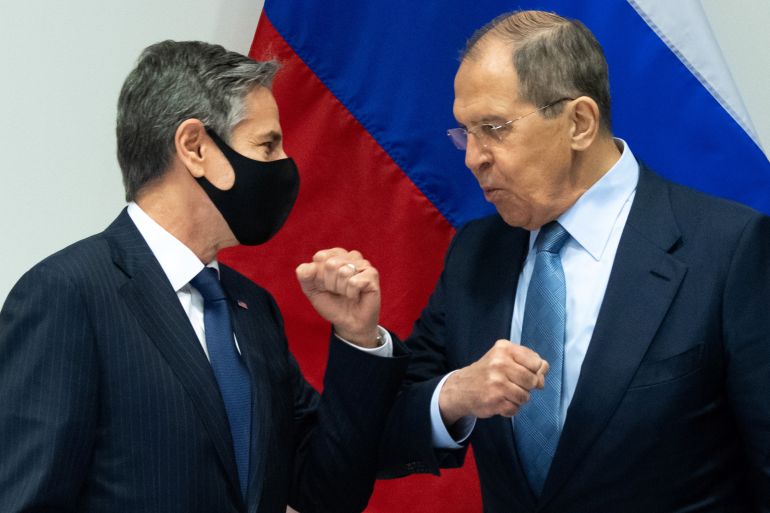US, Russia acknowledge ‘serious differences’ but stress dialogue
Top diplomats Antony Blinken and Sergey Lavrov strike optimistic note at first face-to-face meeting since Joe Biden became US president.

The United States and Russia’s top diplomats have held their first in-person talks acknowledging that while the former Cold War foes have serious differences over how they view world affairs they can still find ways to work together on issues of mutual interest.
US Secretary of State Antony Blinken, in his first meeting on Wednesday with Russian Foreign Minister Sergey Lavrov, a veteran diplomat, said it was “no secret that we have our differences”, but that the world would be safer if the two countries’ leaders worked together.
Keep reading
list of 4 itemsRussia offers to help demarcate Armenia-Azerbaijan border
US-Russia showdown looms as top diplomats meet in Iceland
‘I’m a horrible skeleton’: Navalny in court after hunger strike
Lavrov praised the talks as “constructive” and “useful”, saying both sides understood the need to mend ties.
“The conversation appeared constructive to me,” Lavrov was quoted as saying by Russian news agencies following the discussions in Reykjavik.
Blinken said Biden wanted “a predictable, stable relationship with Russia” and said the two countries could work together on tackling the coronavirus pandemic, combating climate change, dealing with Iran and North Korea’s nuclear programmes and the war in Afghanistan.
“We think that’s good for our people, good for the Russian people and indeed good for the world,” Blinken said.
The discussions marked the first high-level meeting between the two countries since Joe Biden became US president in January and lasted one hour and 45 minutes, longer than the expected one hour.
Lavrov said the diplomats would prepare proposals for a possible meeting between Biden and Russian President Vladimir Putin as early as June, according to Russian state media.
An official summary of the meeting from State Department spokesman Ned Price did not mention the possible presidential summit.
Blinken raised concerns over Russia’s military deployments in and near Ukraine and raised the health of detained Kremlin critic Alexey Navalny, Price said. He also pushed for Russia to release US citizens Paul Whelan and Trevor Reed.
Ties between the two countries have been fraught since March when Biden – not long into his presidency – said he regarded Putin as a “killer”, prompting Moscow to recall its US ambassador for consultations. The envoy still has not returned.
Lavrov said there were “a lot of logjams” in the two countries’ ties and working through them was not easy.
“But I sensed the determination of Antony Blinken and his team to do it. We will not be found wanting,” he said.
Half an hour into Wednesday’s meeting, the US imposed sanctions on some ships and entities involved in the construction of the $11bn Nord Stream 2 pipeline that would take Russian gas from the Arctic to Germany, a deal Biden has opposed. The administration decided, however, to waive sanctions on the company behind the pipeline and its chief executive.
After his brief remarks, Lavrov did not respond to shouted questions on the sanctions.
Before the announcement, Russian Deputy Foreign Minister Sergey Ryabkov had said the waiving of those sanctions would help normalise ties between Moscow and Washington.
Lavrov, summarising Russia’s position in relation to the United States, described it as “very simple”.
“We are ready to discuss all the issues without exception, but under the perception that the discussion will be honest, with the facts on the table, and of course on the basis of mutual respect.”